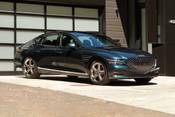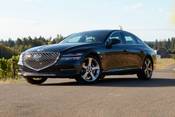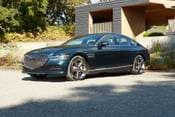2021 Genesis G80 Review
Price Range: $26,990 - $40,990
 View 162 more photos
View 162 more photos View 162 more photos
View 162 more photos View 162 more photos
View 162 more photos View 162 more photos
View 162 more photos View 162 more photos
View 162 more photos+158
Good
8.0
out of 10
edmunds TESTED
The second-generation 2021 Genesis G80 is to its predecessor the way Pulp Fiction is to Reservoir Dogs: the follow-up smash hit to the groundbreaking first attempt. Interior design and materials are on-point, and the driving experience is thoroughly improved. This is a luxury sedan that bypasses the American and Japanese competition to truly go toe-to-toe with the German leaders in this class. However, a few missteps leave it short of the standards set by top-tier rivals.
Selling or Trading-In?
Know what your car is worth while you shop for your next vehicle.
By entering your License Plate or VIN, you'll get a more accurate appraisal that may raise your car's value.
2021 Genesis G80 Review
Pros
- Costs less than comparable luxury sedans in its class
- Roomy interior stays quiet at highway speeds
- High-quality interior design and materials
- Comfortable front seats
Cons
- Rides less smoothly than some rival sedans
- Infotainment interface takes some getting used to
- Cargo space is limited by a rear seat that won't fold flat
What's new
- Redesigned for 2021
- More powerful engines
- New technology features
- Launches the second G80 generation for 2021
Overview
The idea of a Korean luxury automaker was the furthest thing from the public's collective mind when Hyundai launched the Genesis sedan in 2009. But slow and steady progress has indeed resulted in a stand-alone Genesis brand (starting in 2017) and now a full redesign of the midsize sedan that started it all.
For sale near Columbus, OH
18 listings
- $33,987fair price$1,572 below market
- 40,330 miles
- No accidents, 1 owner, personal use only
- 22 City / 30 Hwy MPG
- Jeff Wyler Acura of Fairfield (101 mi away)
- AWD/4WD
- Back-up camera
- Bluetooth
- Navigation
- Sunroof/Moonroof
Close
Located in Fairfield, OH
Jeff Wyler Acura of Fairfield is pleased to offer this fantastic 2021 Genesis G80 2.5T in Uyuni White. Advanced Package (Option Group 02), Prestige Pa...
AutoCheck Vehicle History Summary
Accident Free Vehicle: Yes
Personal Use Only: Yes
History Provider: AutoCheck
Title Details: Clean Title
Salvage Vehicle: No
Frame Damage: No
Theft History: No
Lemon Status: No
Free History Report: No
Features and Specs:
25 Combined MPG (22 City/30 Highway)
Listing Information:
VIN: KMTGB4SC6MU046097
Stock: 6512445A
Certified Pre-Owned: No
Listed since: 08-23-2025 - $27,467fair price$442 above market
- 65,979 miles
- No accidents, 1 owner, personal use only
- 22 City / 30 Hwy MPG
- Jeff Wyler Nissan Fairfield (101 mi away)
- AWD/4WD
- Back-up camera
- Bluetooth
- Navigation
- Keyless Entry/Start
Close
Located in Fairfield, OH
Boasts 30 Highway MPG and 22 City MPG! This Genesis G80 delivers a Intercooled Turbo Premium Unleaded I-4 2.5 L/152 engine powering this Automatic tra...
AutoCheck Vehicle History Summary
Accident Free Vehicle: Yes
Personal Use Only: Yes
History Provider: AutoCheck
Title Details: Clean Title
Salvage Vehicle: No
Frame Damage: No
Theft History: No
Lemon Status: No
Free History Report: No
Features and Specs:
25 Combined MPG (22 City/30 Highway)
Listing Information:
VIN: KMTGB4SC3MU083981
Stock: 4133012A
Certified Pre-Owned: No
Listed since: 09-02-2025
The 2021 Genesis G80 builds on the groundwork laid by its predecessors, offering more technology, driving aids and luxury features than ever before. Genesis has also given it the quad headlight design and large grille that it first introduced on the new GV80 SUV and refreshed G90 large sedan.
The G80 is powered by your choice of two engines. The previously standard V6 has been replaced by a turbocharged 2.5-liter four-cylinder producing 300 horsepower. For more power, there's a new turbocharged 3.5-liter V6 with 375 hp. Rear-wheel drive is standard, and all-wheel drive is optional for the latest G80.
It's a pretty compelling package compared to luxury stalwarts such as the Audi A6, BMW 5 Series and Mercedes-Benz E-Class. Although these sedans haven't been as recently redesigned as the G80, they offer exceptionally high levels of refinement and technology. Other brands, such as Lexus and Volvo, offer luxury alternatives as well. What's our take? Check out the categories of our Expert Rating below for our in-depth review on the new G80.
Edmunds Expert Rating
edmunds TESTED
by the Edmunds Experts
Good
8.0
out of 10
We drove the 2021 Genesis G80 on our test track and on real roads. Our Edmunds team conducts rigorous independent vehicle testing, driving 500,000 miles a year.
Performance
8/10
How does the G80 drive? The redesigned G80 is a solid performer all around. The turbocharged V6, which is what we tested, has plenty of power whether you're hoofing it from a stop or need a squeeze of power on the highway. At our test track, our V6-equipped G80 test vehicle accelerated from 0 to 60 mph in 5.1 seconds. That's a bit slower than six-cylinder German rivals but right on point with the Cadillac CT5 V-Series. Other highlights include smooth and quick transmission shifts and an unobtrusive engine stop-start system.
The G80 3.5T comes standard with an adaptive suspension. (It's otherwise optional on the 2.5T.) Put the car in its Sport mode and the suspension firms up and does a good job of reducing body roll when you drive around turns.
The G80 3.5T comes standard with an adaptive suspension. (It's otherwise optional on the 2.5T.) Put the car in its Sport mode and the suspension firms up and does a good job of reducing body roll when you drive around turns.
Comfort
8/10
How comfortable is the G80? The G80 is sport sedan adjacent, so it should be exceedingly comfortable, right? Yes. Mostly. The plush seats are wonderfully supportive and wide without making you feel like you're being swallowed by them. Other highlights include nicely sculpted rear outboard seats and quick heating for the seats and steering wheel.
Now for the "mostly" part. We expected more from the G80's trick road-scanning adaptive suspension. Overall tuning is on the soft side when you put the car in Normal mode. Pleasingly, there's no residual bounciness after traveling over bigger bumps. However, the ride can get overly brittle over cracked pavement. There's also some noticeable road noise, though wind and engine noise is sufficiently muted.
Now for the "mostly" part. We expected more from the G80's trick road-scanning adaptive suspension. Overall tuning is on the soft side when you put the car in Normal mode. Pleasingly, there's no residual bounciness after traveling over bigger bumps. However, the ride can get overly brittle over cracked pavement. There's also some noticeable road noise, though wind and engine noise is sufficiently muted.
Interior
8/10
How’s the interior? An agreeable ride height and narrow door sills make it easy to get in and out of the G80. The driver literally has the best seat in the house, with additional adjustments (including massage) that aren't available on the front passenger seat. The view outward, though not bunker-like, is hampered slightly by thick front and rear pillars and a tall decklid. Certain features included on our tester — including surround-view and blind-spot cameras — definitely help.
Once inside, tall folks might notice their hair brushing against the headliner in either row. Sub-6-footers should have no problem, however, and you can always slouch a little and take advantage of the prodigious amount of legroom.
The dashboard layout and design are attractive, with a pleasing selection of physical buttons for controls that you might use frequently. The touchpad/wheel infotainment controller presents an initial learning curve. Some of our drivers found it became second nature after some practice, but others never warmed up to it. The display is a short but ultra-wide touchscreen. Touching the right side of it from the driver's seat can be a stretch.
Once inside, tall folks might notice their hair brushing against the headliner in either row. Sub-6-footers should have no problem, however, and you can always slouch a little and take advantage of the prodigious amount of legroom.
The dashboard layout and design are attractive, with a pleasing selection of physical buttons for controls that you might use frequently. The touchpad/wheel infotainment controller presents an initial learning curve. Some of our drivers found it became second nature after some practice, but others never warmed up to it. The display is a short but ultra-wide touchscreen. Touching the right side of it from the driver's seat can be a stretch.
Technology
8/10
How’s the tech? The 21-speaker Lexicon audio system is mind-blowing. Throw on some hip-hop or electronica, and you'll feel the bass in your bones. Even at higher volumes, the speakers did not distort or get muddy. We've experienced inferior systems in Bentleys. The navigation system offers multiple input methods for easy destination search, and the maps display is bright and free of clutter. Using the touchpad/wheel can be distracting, and the voice recognition system returns hits as often as misses. Audi's MMI and Mercedes' MBUX are much better.
The driver aids are fine. The adaptive cruise control works well but the lane-centering feature will sometimes ping-pong the vehicle to either side of the lane. That's not terribly unusual at this stage of automated technology development, but rivals are a little bit smarter. A larger dip in surface pavement caused the collision mitigation braking feature to trigger and momentarily pump the brakes. This is totally unacceptable on any vehicle.
The driver aids are fine. The adaptive cruise control works well but the lane-centering feature will sometimes ping-pong the vehicle to either side of the lane. That's not terribly unusual at this stage of automated technology development, but rivals are a little bit smarter. A larger dip in surface pavement caused the collision mitigation braking feature to trigger and momentarily pump the brakes. This is totally unacceptable on any vehicle.
Storage
7.5/10
How’s the storage? At 13.1 cubic feet, the G80's trunk is larger than the CT5's, the same as the Mercedes-Benz E-Class' but a bit smaller than the BMW 5 Series'. It is quite deep, however, and there are pockets with nets behind each of the wheelwells. Interior storage space is more impressive, with numerous large bins and trays sprinkled throughout the cabin.
Got kids? It can be initially difficult to install a child safety seat because the lower car seat anchors are not as easily accessible as those in other luxury sedans. But once you've got that done, the large rear doors and expansive rear legroom make it easy to get infants in and out.
Got kids? It can be initially difficult to install a child safety seat because the lower car seat anchors are not as easily accessible as those in other luxury sedans. But once you've got that done, the large rear doors and expansive rear legroom make it easy to get infants in and out.
Fuel Economy
7.5/10
How’s the fuel economy? The V6-powered, all-wheel-drive G80 is rated at 21 mpg combined (18 city/26 highway). These numbers aren't stellar for the class, especially since the big three Germans all use mild hybrid powertrains that boost fuel economy. That said, we achieved 24.1 mpg on our mixed-driving 115-mile evaluation route, illustrating that the EPA's numbers should be easy to achieve in real-world driving. The G80 is also more efficient than rivals without whizbang technology. A similarly configured Cadillac CT5 has identical EPA estimates, yet we observed 21 mpg on our evaluation route.
Value
8/10
Is the G80 a good value? Value has always been a Genesis strong suit, and the G80 starts off thousands of dollars less than its German competition. However, our fully loaded test G80 cost more than $69,000, which is only slightly less expensive than similarly equipped top-tier rivals. Conclusion: The G80's best value is lower on the trim ladder.
Interior materials are a pleasant mix of leather, faux leather, open-pore wood and aluminum. The overall effect is simply stunning, especially when you compare this G80 against its predecessor. That said, our tester exhibited a popping noise after hitting a bump or turning the wheel full lock at low speeds, which really marred the luxury experience.
Genesis' warranty coverage can't be beat: five years/60,000 miles bumper-to-bumper and 10 years/100,000 miles for the powertrain. Three years/unlimited miles for roadside assistance is a little stingy, but three years of complimentary maintenance is among the segment's best.
Interior materials are a pleasant mix of leather, faux leather, open-pore wood and aluminum. The overall effect is simply stunning, especially when you compare this G80 against its predecessor. That said, our tester exhibited a popping noise after hitting a bump or turning the wheel full lock at low speeds, which really marred the luxury experience.
Genesis' warranty coverage can't be beat: five years/60,000 miles bumper-to-bumper and 10 years/100,000 miles for the powertrain. Three years/unlimited miles for roadside assistance is a little stingy, but three years of complimentary maintenance is among the segment's best.
Wildcard
8.5/10
The G80 is supremely comfortable in most situations, whether you're stuck in traffic, puttering around town, or cruising on the highway. It's a little slower and less fun to toss around than Germany's best, but the G80 gives you 95% of what you'd expect from a midsize luxury sedan.
Genesis' new shield-like grille is an acquired taste, but you have to admit the G80 doesn't blend into the ether of parking lots anymore. The new cabin design is also hugely impressive compared to the previous model. While the first-generation G80 did a great job differentiating itself from its Hyundai roots, the second-gen model allows Genesis to forge its own distinct identity.
Genesis' new shield-like grille is an acquired taste, but you have to admit the G80 doesn't blend into the ether of parking lots anymore. The new cabin design is also hugely impressive compared to the previous model. While the first-generation G80 did a great job differentiating itself from its Hyundai roots, the second-gen model allows Genesis to forge its own distinct identity.
2021 Genesis G80 trim level differences
The 2021 Genesis G80 is available in two trim levels that depend on the engine selected. The G80 2.5T is powered by a 2.5-liter turbocharged four-cylinder engine (300 horsepower, 311 lb-ft) and the G80 3.5T uses a turbocharged 3.5-liter V6 (375 horsepower, 391 lb-ft). Both engines use an eight-speed automatic transmission and can be optioned with all-wheel drive. Highlighted standard features include:
Which G80 trim does Edmunds recommend?
For the full luxury sedan experience, we'd opt for the G80 3.5T for its more powerful engine and greater number of standard features. To that, we'd add the Prestige package for its impressive array of features. You may want to opt for all-wheel drive if you live in an area with inclement weather.
Compare 2021 Genesis G80 trim levels
Helpful trims summary and side-by-side comparison chart

Best Luxury SUVs of 2025

These Are the Best Cars We've Tested In 2025 ... So Far

2025 BMW X3 vs. 2025 Genesis GV70: Compact Luxury SUV Showdown

2026 Genesis GV70 First Drive: Making a Great SUV Even Better
Cost to Drive
Monthly estimates based on costs in Ohio
$181/mo for G80 2.5T
G80 2.5T
vs
$191/mo
Avg. Large Car
Genesis G80 Owner Reviews
Most Helpful Owner Reviews
Trending topics
poor service with continued issue with car
2 out of 5 starsTunaman, 11/18/2021
2021 Genesis G80 2.5T 4dr Sedan AWD (2.5L 4cyl Turbo 8A)
I purchased a new 2021 black Genesis G80 in February 2021. I put a very small amount of mileage on vehicle as at the mid-November I have 5200 miles. I had an issue while driving on the highway at 65 MPH and the emergency braking came on, locked the steering wheel and started to swerve on its own. I immediately took it into the local Genesis dealer where I had purchased and, they kept … it for 5 days and stated they could not replicate the issue. I took it on vacation 300 miles and it worked fine on the way to our destination, but on the way back the incident happened 2 more times. I called the dealership and they asked that I bring it in again. I did and now 3 days later, they state the can not replicate the issue and have to go to Genesis engineering to ask if more cases of this. I have also service the vehicle at 3750 miles. The offer of service when purchased was they would drive you a loaner and pick up the car from you for service. So far no one has been available to pick up the car or bring a loaner. Actually no loaner has ever been available. I am awaiting to see if it can be fixed, if not I will be applying under the lemon law as the car is unsafe for driving. All the cases I was driving roughly 65 MPH, going straight and not close to another car.
Very poor overall service. I have had a few sonatas and they have all been fine and this is my second Genesis and I am very disappointed.
Outstanding Car!
5 out of 5 starsJames, 10/08/2021
2021 Genesis G80 3.5T 4dr Sedan (3.5L 6cyl Turbo 8A)
The technology and build quality on this car are superb. I have a 3.5L Prestige. It got 30 mpg on a 600 mile trip recently. Smart cruise and driving assist are great. This is my 3rd Genesis and by far the best. Love the Lexicon sound, adaptive suspension and the styling.
6 month update. Car is excellent in styling, performance and features. The sunroof snaps and pops over bumps … and uneven pavement. This ruins the luxury car experience. Genesis needs to update their engineering g and quality to play with the Japanese and Europeans.
Love this car
5 out of 5 starsJake, 04/08/2021
2021 Genesis G80 2.5T 4dr Sedan AWD (2.5L 4cyl Turbo 8A)
The new2021 Genesis G80 is a work of art. Styling awesome, features exceptional, ride quiet, comfortable, good handling and acceleration. While early in ownership, this car is exceptional for price. Warranty is better than competitors, service included, list goes on. This is impressive.
Excellent comfort ride
5 out of 5 starsMike L., 08/31/2021
2021 Genesis G80 3.5T 4dr Sedan AWD (3.5L 6cyl Turbo 8A)
Had a test drive and fall in love with this car. Comfort oriented suspension with great handling, accurate shifting 8 speed transmission, with strong V6 engine with more than enough low end torque. My highway average gas mileage has been about 27-28 mpg on summer blend gas. It is a must test drive car for those who want a reliable luxury smooth riding sedan.
2021 G80 Highlights
2.5T
| Base MSRP Excludes Destination Fee | $47,700 |
|---|---|
| Engine Type | Gas |
| Combined MPG | 26 MPG |
| Cost to Drive | $181/month |
| Seating | 5 seats |
| Cargo Capacity All Seats In Place | 13.1 cu.ft. |
rear wheel drive | |
| Warranty | 5 years / 60,000 miles |
Safety
Our experts like the G80 models:
- Rear Occupant Alert
- Uses sensors to detect the presence of rear passengers and can alert the driver both before and after he or she exits the vehicle.
- Lane Departure Warning/Lane Keeping Assist
- Issues audible warning if the driver drifts from the lane without signaling. Introduces subtle steering input to keep the car in the lane.
- Driver Attention Alert
- Monitors and analyzes driver steering, lane position and drive time, and alerts the driver if it detects erratic driving patterns.
NHTSA Overall Rating
5 out of 5 starsThe National Highway Transportation Safety Administration offers independent analysis.
- Frontal Barrier Crash RatingOverall5 / 5Driver4 / 5Passenger5 / 5
- Side Crash RatingOverall5 / 5
- Side Barrier RatingOverall5 / 5Driver5 / 5Passenger5 / 5
- Combined Side Barrier & Pole RatingsFront Seat5 / 5Back Seat5 / 5
- RolloverRollover5 / 5Dynamic Test ResultNo TipRisk Of Rollover10.1%
People who viewed this also viewed
| 5.0 average Rating out of 1 reviews. |
| Starting at $42,500 |
| 4.1 average Rating out of 15 reviews. |
| Starting at $58,200 |
| 4.5 average Rating out of 12 reviews. |
| Starting at $42,140 |
Related Used 2021 Genesis G80 info
Vehicle reviews of used models
- Toyota Corolla Hybrid 2021 Review
- Volkswagen Arteon 2020 Review
- Toyota Avalon Hybrid 2021 Review
- Chevrolet Spark 2020 Review
- Volkswagen Jetta 2021 Review
- Rolls Royce Dawn 2020 Review
- Volkswagen Tiguan 2020 Review
Shop similar models
- Used Genesis G90 2025
- Used Kia K900 2020
- Used Genesis G70 2026
- Used Lincoln MKS 2016
- Used Audi S4 2025
- Used Lexus Is-350 2023
- Used Lexus GS-350 2020
- Used Lexus Is 2025
- Used Lexus LS-500 2023
Shop used vehicles in your area
Popular new car reviews and ratings
Research other models of Genesis
- New Genesis G70
- Genesis G90 2025
- 2026 GV70
- New Genesis GV80
- 2025 Genesis GV80 Coupe
- New Genesis G80
- 2025 GV60
- 2024 G90
Research similar vehicles
Other models
- New Acura RDX for Sale in Plainview, NY
- Used Kia Optima-Plug-In-Hybrid in Winter Springs, FL 2020
- Used Toyota MR2 in Riverton, UT 1995
- Used Suzuki Forenza in Magnolia, TX 2008
- Used Audi SQ7 in San Lorenzo, CA 2025
- New Toyota Rav4-Hybrid for Sale in Lake Forest, IL
- Used Aston-Martin DB9 in Washington, PA 2015
- New Chevrolet Colorado for Sale in Yakima, WA
- New Nissan Titan for Sale in Philadelphia, PA
- Used BMW 6-Series-Gran-Turismo in Pullman, WA 2019

